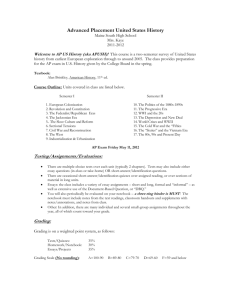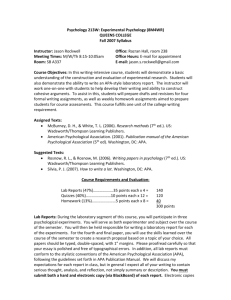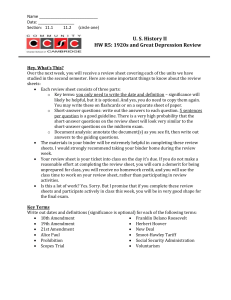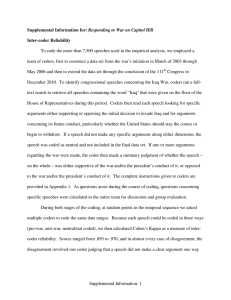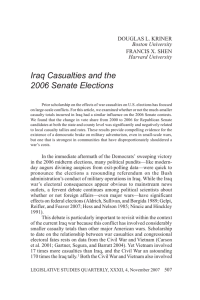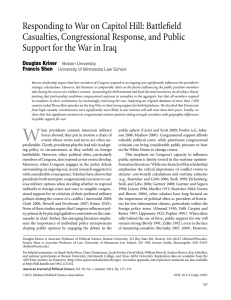Syllabus - Aaron M Hoffman.com
advertisement
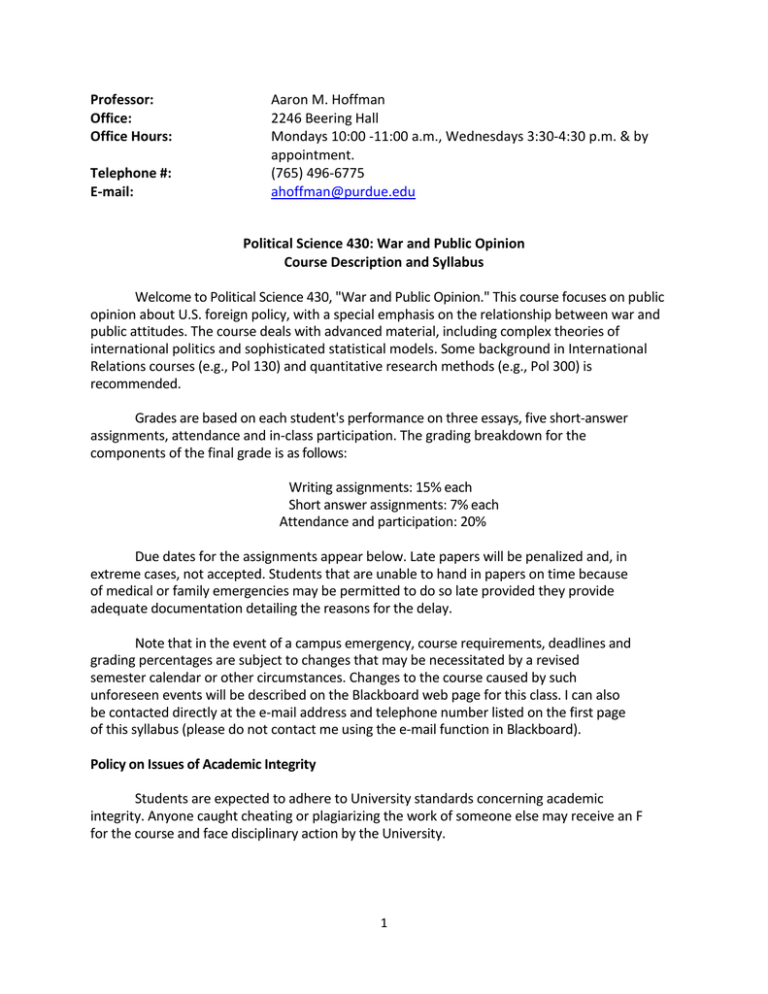
Professor: Office: Office Hours: Telephone #: E-mail: Aaron M. Hoffman 2246 Beering Hall Mondays 10:00 -11:00 a.m., Wednesdays 3:30-4:30 p.m. & by appointment. (765) 496-6775 ahoffman@purdue.edu Political Science 430: War and Public Opinion Course Description and Syllabus Welcome to Political Science 430, "War and Public Opinion." This course focuses on public opinion about U.S. foreign policy, with a special emphasis on the relationship between war and public attitudes. The course deals with advanced material, including complex theories of international politics and sophisticated statistical models. Some background in International Relations courses (e.g., Pol 130) and quantitative research methods (e.g., Pol 300) is recommended. Grades are based on each student's performance on three essays, five short-answer assignments, attendance and in-class participation. The grading breakdown for the components of the final grade is as follows: Writing assignments: 15% each Short answer assignments: 7% each Attendance and participation: 20% Due dates for the assignments appear below. Late papers will be penalized and, in extreme cases, not accepted. Students that are unable to hand in papers on time because of medical or family emergencies may be permitted to do so late provided they provide adequate documentation detailing the reasons for the delay. Note that in the event of a campus emergency, course requirements, deadlines and grading percentages are subject to changes that may be necessitated by a revised semester calendar or other circumstances. Changes to the course caused by such unforeseen events will be described on the Blackboard web page for this class. I can also be contacted directly at the e-mail address and telephone number listed on the first page of this syllabus (please do not contact me using the e-mail function in Blackboard). Policy on Issues of Academic Integrity Students are expected to adhere to University standards concerning academic integrity. Anyone caught cheating or plagiarizing the work of someone else may receive an F for the course and face disciplinary action by the University. 1 Course Topics and Assigned Readings There are no required books for this class. All the required reading material is available through the Purdue University Libraries website and on Blackboard. The topics and assigned readings for this course appear below. Week One (January 9-13): Review of US foreign policy institutions. Week Two (January 18-20): Review of U.S. foreign policy institutions. Week Three (January 23-27): Overview of research on public opinion and U.S. foreign policy Holsti, Ole.R. 1992. Public opinion and foreign policy: Challenges to the AlmondLippmann Consensus Mershon Series: Research programs and debates. International Studies Quarterly: 439-466. January 27: Short answer assignment one due (start of class) . Week Four (January 30-February 3): Is public opinion “rational”? Shapiro, Robert Y., and Benjamin I. Page. 1988. Foreign Policy and the Rational Public. Journal of Conflict Resolution 32 (2): 211-247. Caplan, Bryan. 2007. "The Myth of the Rational Voter: Why Democracies Choose Bad Policies." Bartels, Larry M. "The Irrational Electorate." The Wilson Quarterly. URL: http://www.princeton.edu/~bartels/how_stupid.pdf February 3: Writing assignment one due (start of class). Week Five (February 6-10): The rally effect. Baum, Matthew A. 2002. "The Constituent Foundations of the Rally-Round-the Flag Phenomenon." International Studies Quarterly. 46: 263-298. Parker, S.L. 1995. Towards an Understanding of "Rally" Effects. Public Opinion Quarterly 59 (4): 526-546. February 10: Second short answer assignment due (start of class). Week Six (February 13-17): The inexorable decline thesis. Mueller, John. 2005. "The Iraq Syndrome." Foreign Affairs. 84:6, pp. 44-54. 2 Gartner, Scott Sigmund and Gary M. Segura. 1998. "War, Casualties, and Public Opinion." The Journal of Conflict Resolution. 42:3, pp. 278-300. Recommended Mueller, John E. 1971. "Trends in Popular Support for the Wars in Korea and Vietnam." American Political Science Review. 65:2, pp. 358-372. February 17: Writing assignment one (revised) due (start of class). Week Seven (February 20-24): Mission objectives and public opinion. Jentleson, Bruce. 1992. "The Pretty Prudent Public: Post-Vietnam Public Opinion on the Use of Military Force." International Studies Quarterly. 36:1, pp. 49-73. Jentleson, Bruce W., and Rebecca L. Britton. 1998. Still Pretty Prudent. Journal of Conflict Resolution 42 (4): 395-417. February 24: Writing assignment two due (start of class). Week Eight (February 27-March 2): Leadership and public opinion. Larson, Eric V. 1996. Casualties and Consensus: The Historical Role of Casualties in Domestic Support for US Military Operations. Chs.1-5. URL: http://www.rand.org/pubs/monograph_reports/MR726/index.html. Week Nine (March 5-9): Success and public opinion. Gelpi, Christopher, Peter D. Feaver, and Jason Reifler. 2005/2006. "Success Matters: Casualty Sensitivity and the War in Iraq." International Security. 30:3, pp.7-46. Eichenberg, Richard C. "Victory Has Many Friends: US Military Force and Public Opinion 1980-2005." International Security. 30:1, pp. 140-177. March 7: Short-answer assignment three due. Week Ten (March 12-14): Spring Break Week Eleven (March 19-23): Partisanship and public opinion. Berinsky, Adam J. 2007. "Assuming the Costs of War: Events, Elites, and American Public Support for Military Conflicts." Journal of Politics. 69:4, pp. 975-997. March 23: Short-answer assignment four due (start of class). Week Twelve (March 26-30): Media influences on war support. 3 Baum, M.A., and T. Groeling. 2010. Reality asserts itself: Public opinion on Iraq and the elasticity of reality. International Organization 64 (03): 443-479. Groeling, T., and M.A. Baum. 2009. Journalists’ Incentives and Media Coverage of Elite Foreign Policy Evaluations. Conflict Management and Peace Science 26 (5): 437-470. Week Thirteen (April 2-6): Class cancelled Week Fourteen (April 9-13): Sunk costs and war support Boettcher, William A., and Michael D. Cobb. 2009. “Don’t Let Them Die in Vain”. Journal of Conflict Resolution 53 (5): 677-697. Schott, John Paul, Laura D. Scherer, and Alan J. Lambert. 2011. Casualties of war and sunk costs: Implications for attitude change and persuasion. Journal of Experimental Social Psychology 47 (6): 1134-1145. April 13: Short-answer assignment five due (start of class). Week Fifteen (April 16-20): Race, gender, and casualty sensitivity. Eichenberg, Richard C. "Gender Differences in Public Attitudes Toward The Use of Force by the United States 1990-2003." International Security. 28:1, pp. 110-141. Gartner, Scott Sigmund and Gary M. Segura. 2000. "Race, Casualties, and Opinion in the Vietnam War." Journal of Politics. 62:1, pp. 115-146. Week Sixteen (April 23-27): Conclusions April 27: Writing assignment three due (start of class). 4

